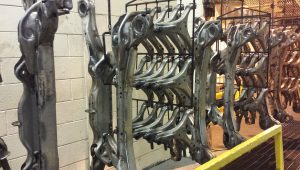 Today’s TMC (transition metal coating) conversion coatings are a big step forward in finishing. Helping to eliminate iron and zinc phosphates in many processes—TMC coatings can help manufacturers lower their overall environmental impact; while still meeting adhesion and salt spray specifications.
Today’s TMC (transition metal coating) conversion coatings are a big step forward in finishing. Helping to eliminate iron and zinc phosphates in many processes—TMC coatings can help manufacturers lower their overall environmental impact; while still meeting adhesion and salt spray specifications.
The major process differences between many conventional iron, zinc phosphate surface treatments and TMC coatings lie in cleaning temperature and rinsing. Temperatures in TMC processes are generally lower than the typical 140-180°F—commonly running from “ambient” temperature to 120°F. Higher temperatures had traditionally helped removal of oil-based and chlorinated paraffin-based stamping lubricants and thicker, soap/paste-type stamping lubricants that were widely used for heavy duty stamping.
If a water “pre-wash” stage is employed prior to a surface cleaning stage, much of the water-based lubricant can be removed prior to actual cleaning —making that stage more effective, more able to address surface scale and helping extend cleaner bath life.
As TMC coatings require excellent surface cleanliness and rinsing—water-based stamping lubricants offer enhanced ease of removal and less potential loading and carry-over from stage to stage compared to oil-based stamping lubricants.
To see how water-based stamping fluids can positively impact your pretreatment process—contact IRMCO for a review of your current stamping, storage and finishing processes. Process improvement is “just below the surface”.


